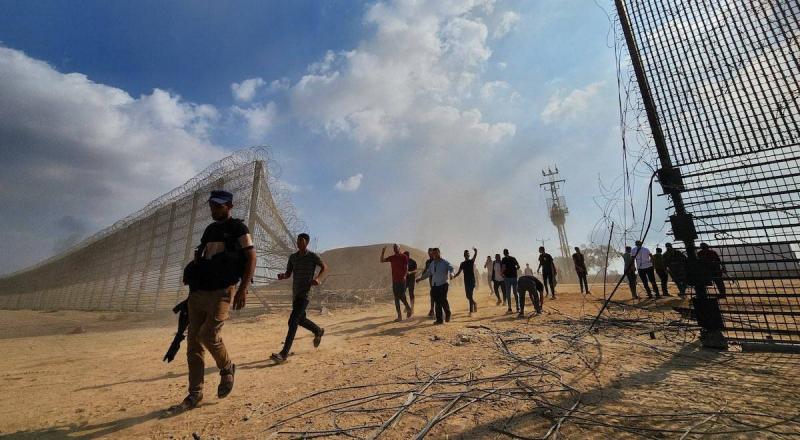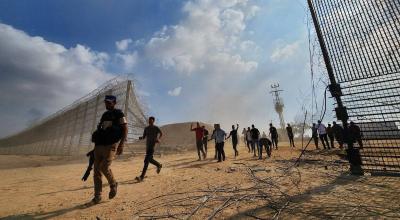The comprehensive regional war, for which some extremist and collaborating voices are calling, is nothing but a wish expressed by the policies, speeches, and media of the enemies of Arab societies, peoples, and states, who seek to destabilize their security, peace, and social and political stability. October 7, 2023, marks the beginning of a new phase of continued escalation and ongoing conflict in the Middle East. Yes, this vast geographical region—from its far east in Afghanistan and Iran to its far west in Morocco and Mauritania, from its far north in Turkey to its far south in Yemen and the African Sahel—has witnessed throughout human history, tensions, security escalations, and military conflicts across all its areas, regions, cities, and diverse communities and peoples.
If the distant and recent histories of this region witnessed the rise and fall of great empires competing for international dominance, that imperial conflict came to an end following World War II in 1945, leading to a new phase of escalation and conflict characterized by new tools and different policies. Indeed, the post-World War II era (1945) until the end of the Cold War in 1991 witnessed a new kind of tension and armed struggle based on the establishment of the State of Israel on Palestinian territories that were under British mandate, which was in turn facilitated by the Balfour Declaration in November 1917. After the establishment of the State of Israel in 1948 and until the end of the Cold War in 1991, the political tension in the region evolved into a conflict between Arab states on one side and Israel on the other, gradually transitioning into a security escalation involving Arabs and Israel along with its Western allies, including British and French participation during the aggression against Egypt in 1956.
As a consequence of the ongoing security tension, the region transitioned into a phase of armed military conflict between Arab states and Israel, fully supported by the United States and Western countries, leading to direct military conflicts in 1967 and 1973, along with the War of Attrition, which ended with a long-term ceasefire after the Camp David Accords between Egypt and Israel in September 1978. Throughout the years of the Cold War, the political tension and military escalation persisted due to the global division between the two superpowers, the United States and the Soviet Union, each striving to enhance its international influence.
Following the end of the Cold War (1991), the region entered a new phase of political tension and security escalation in line with regional and international transformations. The security escalation and military conflict, which had been confined to direct Arab-Israeli confrontations, gradually transformed into conflicts involving armed militias and extremist groups associated with Iran in certain Arab regions, against Israel. Since the end of the Cold War and the advent of American unipolarity in 1991, following the signing of the Oslo Accords, known as the "Declaration of Principles on Interim Self-Government Arrangements," between the Palestine Liberation Organization and Israel in September 1993, the Middle East has experienced a new political tension driven by Iran’s extremist policies towards all Arab societies, along with its interference in the internal affairs of all states in the region, in addition to Israel’s extremist policies rejecting all international decisions and laws regarding Palestinian rights.
During this period extending until October 2023, the region has witnessed political tensions, security escalations, and armed conflicts, with Iran confronting all the states in the area, while Israel countered Iran and its proxies, including the extremist party in Lebanon. In this long historical timeline from the end of World War II in 1945 to October 2023, which has seen successive political tensions, continuous security escalations, and numerous armed conflicts, the region has never experienced a comprehensive war despite severe political tensions, security escalations, and armed conflicts. There have also been no political, security, or military speeches calling for a comprehensive war, regardless of its level, over the past 77 years.
If this is the reality based on established historical information today, why have voices calling for an impending comprehensive war in the Middle East escalated since October 7, 2023, as a result of the ongoing military conflict in Gaza? Answering this complex question requires a glance back at the Khomeini revolution in Iran in 1979 and the extreme ideology that emerged from it. Following Khomeini's takeover of power in Tehran, he adopted an extremist ideology aimed at destroying and undermining Arab societies, spreading extremism and terrorism in the Middle East through interference in the internal affairs of Arab states, and supporting and financing extremist, treacherous elements within their nations.
To achieve this destructive Khomeinist ideology towards the Arab region, Iran required a more powerful ideology that could resonate with Arab and Islamic peoples, represented by the importance of utilizing the Palestinian cause to serve the extreme Khomeinist ideology against Arab communities. Based on these destructive and extremist ideas, Iranian politics over the past forty years since 1979 have sought to exploit the Palestinian issue in its political, media, and intellectual discourse, supporting and financing extremist and terrorist groups under the pretext of defending the Palestinian cause. As a result of this destructive Iranian policy based on the extremist Khomeinist ideology, Iran, through its proxies and armed militias, has managed to draw some Arab communities into direct conflict with Israel, accomplishing its planned outcomes by destabilizing security and peace in those Arab communities and hindering their economic and social development.
While these results may seem somewhat satisfying for Iranian extremist ideology, they represent a phase in which Iran has achieved its short-term objectives of creating proxies and militias within some Arab communities, serving as a starting point for a new phase aimed at undermining the security and stability of all Arab societies and states by drawing them into direct armed conflict with Israel and its Western backers led by the United States. Understanding this Iranian strategy based on the extremist Khomeinist ideology helps clarify who stands behind the rising voices calling for a comprehensive regional war following October 7, 2023.
In conclusion, it is important to state that the events of October 7, 2023, and the subsequent extremist reactions aim primarily to pull Arab communities into direct conflict, either internally by fostering division among the populace and their political systems, or externally through sudden and unbalanced armed confrontations with Israel and its American allies. The comprehensive regional war that certain extremist and collusive voices are calling for is merely a wish articulated by the policies, speeches, and media of the enemies of Arab societies and states, aiming to destabilize their security and social and political stability, and seeking to draw them into armed conflicts that drain their resources and halt their comprehensive development plans. This reflects the long-term strategies of adversaries, executed gradually through treacherous Arab elements who collaborate with the enemies of Arab societies.




